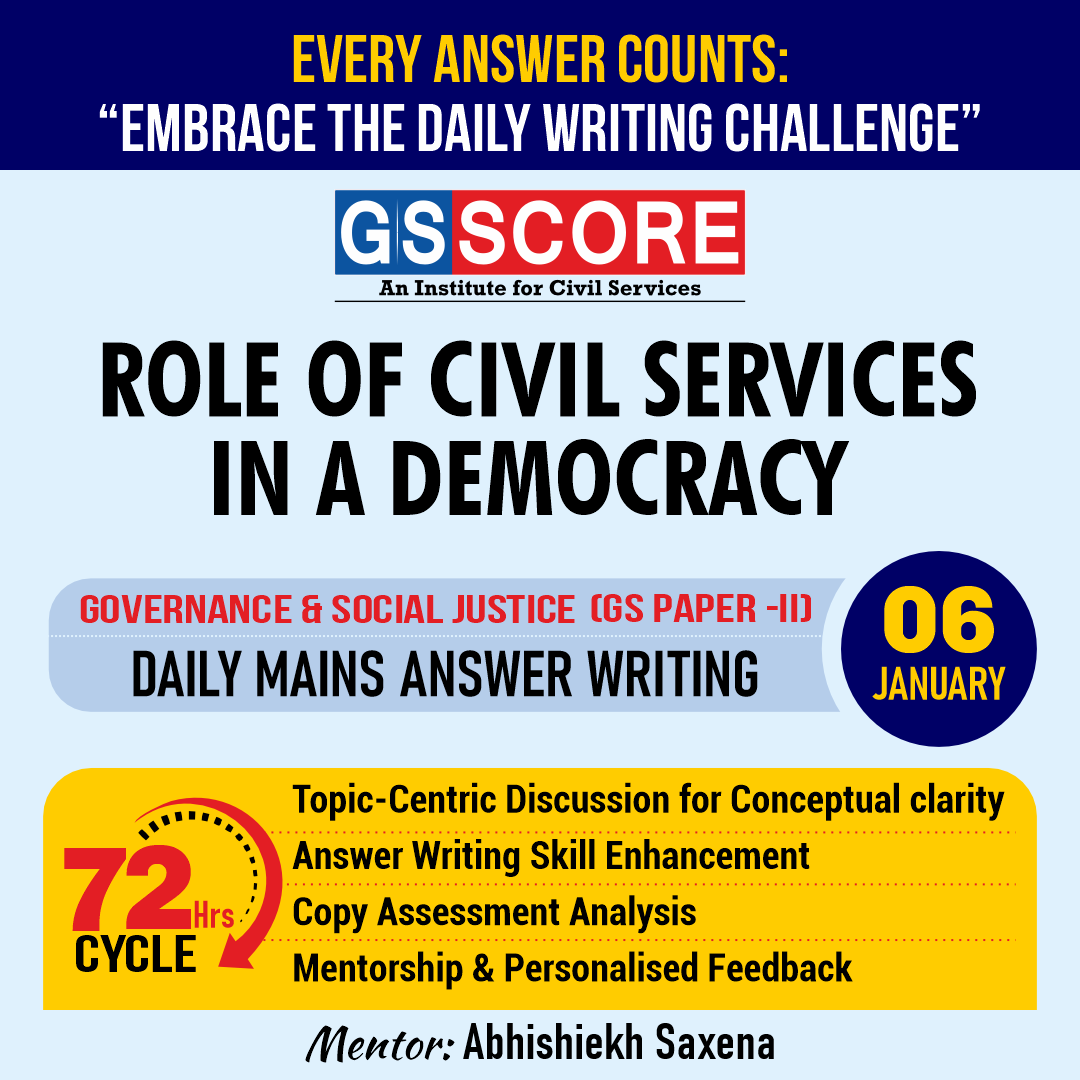


Instruction:
- There will be 2 questions carrying the First Question is-10 marks Write your answers in 150 words and the Second Question is-15 marks Write your answers in 250 words.
- Any page left blank in the answer-book must be crossed out clearly.
- Evaluated Copy will be re-uploaded on the same thread after 2 days of uploading the copy.
- Discussion of the question and one to one answer improvement session of evaluated copies will be conducted through Google Meet with concerned faculty. You will be informed via mail or SMS for the discussion.
Question #1. Traditional bureaucratic structure and culture have hampered the process of socio-economic development-in-India."Comment. 10 marks (150 words)
Question #2. Institutional quality is a crucial driver of economic performance. In this context suggest reforms in Civil Service for strengthening democracy. 15 marks (250 words)
(Examiner will pay special attention to the candidate's grasp of his/her material, its relevance to the subject chosen, and to his/ her ability to think constructively and to present his/her ideas concisely, logically and effectively).
STEPS & INSTRUCTIONS for uploading the answers
Step 1 - The Question for the day is provided below these instructions. It will be available at 7:00 AM.
Step 2 - Uploading of Answers : Write the answer in A4 Sheet leaving proper margins for comments and feedback and upload the PDF in MY ACCOUNT section. Click on the option of SUBMIT COPY to upload the PDF.
Step 3 - Deadline for Uploading Answers: The students shall upload their answers by 7:00 PM in the evening same day. The first 50 copies will be evaluated.
Step 4 - Feedback : Mentors will give their feedback for the answers uploaded. For more personalised feedback, join our telegram channel by clicking on the link https://t.me/mains_answer_writing_cse . A one-to-one session will be conducted with the faculty after copy evaluation in 72 Hrs.
Model Answer
Question #1. Traditional bureaucratic structure and culture have hampered the process of socio-economic development-in-India."Comment. 10 marks (150 words)
Sardar Patel famously called the Indian Administrative Service the “steel frame” of India’s government machinery. He, and many others, viewed the IAS as the solid foundation upon which the rest of the bureaucracy rested, a bastion of the nation’s best and brightest providing unfailing support to others in government.
To this day, even with vastly increased opportunities in the private sector, the IAS continues to attract India’s best and brightest. Yet, despite the exceptional talent within the IAS, the institution no longer serves the greater interest of the country. Instead, there are reasons to believe that it might be hampering the country’s development.
- Bureaucracy refers to a hierarchical organization in which functions and powers are divided as per formal rules and regulations. There is a hierarchy system and the lower ones are working under the upper management.
- Officials remain unattached and are only concerned with their job without becoming personally involved. The British, of course, designed ICS and the rest of the government machinery around it with the explicit goal of allowing a very small number of men to control a very large population. To this end, they concentrated all power and authority in the hands of these very few men with the rest of government acting as a support structure.
- Being a permanent executive not directly responsible to the popular demands and ensuring the system to work in a proper manner, irrespective of the elections results is seen as a prime work. Success of the schemes /initiatives depends upon the proper implementation on the ground level, and the implementation part rests with the bureaucrats.
- The local political interference and the cold-war btw the local political representatives and the coveted administrator are not new, and it also gives wrong signal to the public in general when such things come in open.
- Bureaucracy encourages the evil work of government into a number of isolated and self dependent sections each pursuing its own needs without any adequate correlation with the rest
- The discretionary power which rests in the hand of the bureaucrats makes him look like the sole authority in the eyes of common masses. Such powers have been used by the ranks very fruitfully also as well as selfishly. So, it was referred as steel frame means whatever the mortar comes off, the structure and working of system will not get changed for the disadvantages of the people.
- In recent times the red-tapism and policy paralysis has been pointed out by the Government. As well as Civil society as a cause of non- decisiveness and lack of works visible on the ground. Officials are bound by rules and these rules regulate the office conduct. Rules become more important at times than the goal of the organization leading to red tapism.
- The Planning Commission has highlighted how the short tenures of civil servants have led to a far less effective management system for civil servants in India than in China. Very often, it leads to the elevation of ineffective civil servants in key administrative positions. This happens because pliant bureaucrats are much more acceptable to the political executive even if the effects of such postings are positively harmful for governance.
It is a mix of both being a steel frame and caged, former because it steel enjoys the immunity and discretionary power. It has been provided the constitutional immunity as well and it works joining the shoulder with shoulder of the other wings of the “state”. It is caged because everything where it is rule of law is bounded by that cage, even in the case where other cages are not there.
Bureaucracy loves tradition and stands for conservatism which develops a negative psychology that breeds non-transparency and stoppage to information.
Arvind Panagariya, economic advisor of PM, Professor of economics and an expert on the Indian civil service has two sensible suggestions for improvement of bureaucracy:
- More top positions in government should be opened up to competition from candidates outside the IAS. At a minimum, all top secretary level positions should be opened up to competition from at least the state services, if not to outside candidates. In any democracy, ministers should be allowed to choose their top deputies. Going further and opening up all positions at the joint secretary level is also worth considering.
- Specialization should be encouraged because today Indian bureaucrats must oversee the administration of a vastly complicated government apparatus and regulate an equally complicated private sector. In this context, specialized skills are an absolute necessity for an effective civil service.
Lloyd George called it “the steel frame on which the whole structure of our government and of our administration in India rests”, and the IAS has kept the steel frame pretty much intact.
Question #2. Institutional quality is a crucial driver of economic performance. In this context suggest reforms in Civil Service for strengthening democracy. 15 marks (250 words)
Institutional quality in a democracy determines how successful the government machinery adheres to the principles of public service, rule of law, and social justice. One such institution is the Civil Services, which acts as a link between the Government & Citizenry and strengthens democracy.
Importance of the Civil Services
- Basis of Government:There can be no government without administrative machinery.
- Implementing Laws & Policies: Civil services are responsible for implementing laws and executing policies framed by the government.
- Stabilising Force:Amidst political instability, the civil service offers stability and perfomance. While governments and ministers can come and go, the civil services is a permanent fixture giving the administrative set up a sense of stability and continuity.
- Instruments of Social Change & Economic Development:Successful policy implementation will lead to positive changes in the lives of ordinary people. It is only when the promised goods and services reach the intended beneficiaries, a government can call any scheme successful. The task of actualising schemes and policies fall with the officers of the civil services.
However, there are many challenges faced by civil services, which act as a roadblock in the path of democracy
- Status Quoist:As instruments of public service, civil servants have to be ready for change. The common experience, however, is that they resist changes as they are wedded to their privileges and prospects and thereby, have become ends in themselves.For example, the 73rd and 74th Amendments to the Constitution have envisaged democratic decentralization.However, due to the reluctance on the part of the civil servants to accept the changes in control and accountability, the intended vision has not been achieved.
- Rule-Book Bureaucracy:By the rule book bureaucracy, it meant mainly following the rules and laws of the book without taking care of the actual needs of the people.Due to rule book bureaucracy, some civil servants have developed the attitude of‘ bureaucratic behavior’, which evokes issues like red-tapism, the complication of procedures, and the maladapted responses of ‘bureaucratic’ organizations to the needs of the people.
- Political Interference:The political representative for the sake of fulfilling the populist demand, influences the functioning of administrative officials. Hence, an administrative official has to adhere to the will of the political master.This interference sometimes leads to issues like corruption, arbitrary transfers of honest civil servants.Also, this led to substantial inefficiency where the vital positions are not held by the best officers and ultimately this can lead to institutional decline.
Civil Services Reforms for economic performance and strengthening democracy.
- Prompt Delivery Of Services:Every department should seek to simplify their processes to cut administrative delays and ensure participatory feedback mechanisms for efficient service delivery.
- Reducing Discretion & Enhancing Accountability Mechanism:There is an inherent need to set key responsibility/focus areas and progressively reduce discretionary aspects to evaluate civil servants.Online Smart Performance Appraisal Report Recording Online Window (SPARROW) should be instituted in all central and state cadres.Also, as suggested by many committees, there is a need to develop benchmarks to assess the performance of officers and compulsorily retire those deemed unable to meet the benchmarks.
- Incorporation of Code of Ethics:As suggested by 2nd ARC, along with streamlining of code of conduct rules, there is a need to inculcate ethical underpinning in the civil servants by implementing Code of Ethics.This will sensitize civil servants to problems of people and help in the resolution of ethical dilemmas, which tend to emerge frequently in the public sphere.
- De-politicization of bureaucracy: the bureaucrats’ primary purpose of providing non-partisan and efficient administration. So training in how to remain non- partisan need to be inculcated.
Checking the Politicians – bureaucrats – Businessman nexus: The nexus was borne out of license quota raj where politicians and bureaucrats had discretionary power over allocation of natural resources in the country. This led to this unholy nexus and crony capitalism. It has undermined the democratic credentials of the country. So there is need of creation of check and balance
Sardar Patel considered the civil service “the steel frame of government machinery” as its main intent is to strengthen the administrative capacity to perform important government functions.However, without adequate reforms, this steel frame may start to get corrosion and may collapse. Therefore, in order to deal with present-day challenges and strengthen democracy, there is a need to carry out Civil services reforms in a holistic way.


